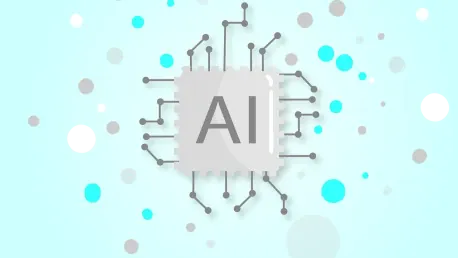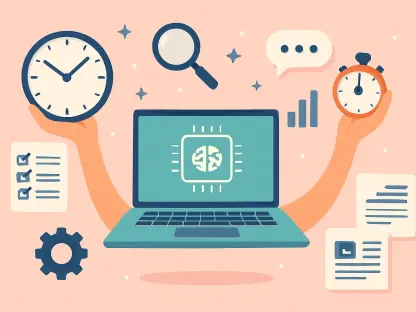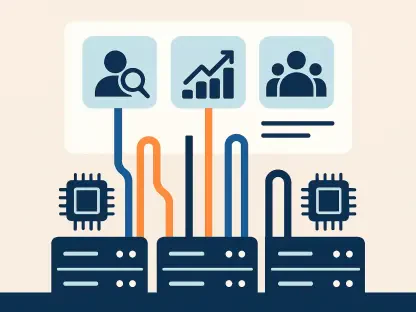The European business landscape is on the cusp of a transformative shift driven by Generative Artificial Intelligence (GenAI), an innovation that promises to redefine project management by enhancing efficiency, creativity, and innovation. As businesses strive to stay competitive in a rapidly evolving global market, the urgency for European companies to adopt GenAI becomes increasingly pressing. This technological marvel is not merely a tool but represents a fundamental change in how projects are managed and delivered, requiring a strategic and comprehensive approach to implementation.
The AI-Driven Shift in Project Management
Generative AI is ushering in a new era in project management, one where the traditional roles and responsibilities are being redefined to include advanced capabilities. European project managers have started integrating GenAI into their workflows, almost doubling in number from January to April. This rapid adoption points to a broader trend—going beyond merely automating routine tasks to transforming strategic thinking, creative problem-solving, and comprehensive data analysis capabilities. The urgency for businesses to embrace this technology is clear, as lagging behind could mean missing out on significant competitive advantages.
Beyond the scope of simple automation, GenAI introduces a paradigm shift in how projects are conceived, planned, and executed. Project managers are no longer confined to traditional methodologies; instead, they can leverage AI to explore new horizons in efficiency and innovation. This AI-driven shift not only enhances individual project outcomes but also sets a new standard for organizational excellence. As more European businesses recognize the potential of GenAI, the landscape of project management is poised for a revolution, one that could redefine success metrics and competitive benchmarks on a global scale.
Reimagining Efficiency and Automation
Efficiency gains with Generative AI extend far beyond simple task automation, presenting an opportunity to revolutionize the very essence of project management. By automating mundane activities such as reporting, meeting summaries, and basic data analysis, GenAI allows project managers to redirect their focus towards more complex and strategic tasks. This shift not only frees up valuable time but also fosters more thoughtful and effective management. The reliable and rapid handling of routine tasks by AI ensures that projects run smoothly, reducing errors and increasing overall productivity.
The implications of this efficiency extend to various facets of project management. For instance, automated reporting can provide real-time insights into project status, while AI-generated meeting summaries ensure that all stakeholders are on the same page. These capabilities reduce the administrative burden on project managers, allowing them to concentrate on critical decision-making processes. Moreover, the integration of GenAI in data analysis enables more accurate forecasting and risk assessment, contributing to better-informed strategies and planning. As a result, the overall project lifecycle becomes more streamlined, effective, and capable of delivering superior outcomes.
Enhancing Strategic Planning and Risk Anticipation
GenAI’s true potential lies in its ability to foresee risks before they materialize, allowing teams to adapt and prevent costly setbacks. It can swiftly generate complex project plans, evaluate numerous variables, and optimize for success from the outset. This predictive power enables project managers to stay ahead of potential problems and make data-driven decisions, thus enhancing the strategic planning process. By leveraging GenAI, project managers can significantly improve project outcomes and reduce the likelihood of unexpected issues derailing progress.
The foresight offered by GenAI transforms the way projects are planned and executed. Traditional project management often involves a reactive approach to risk, dealing with issues as they arise. In contrast, GenAI enables a proactive stance, where potential risks are identified and mitigated well in advance. This shift not only improves the resilience of projects but also contributes to a culture of continuous improvement and learning. By incorporating AI insights into the planning phase, teams can devise more robust and adaptable strategies, ensuring that projects remain on track and within scope, budget, and time constraints.
Boosting Creativity and Innovation
Generative AI serves as a catalyst for creativity and innovation, breaking down conventional thinking barriers and opening new avenues for exploration. By analyzing extensive datasets and identifying patterns that may not be immediately visible to human observers, GenAI brings fresh perspectives and ideas to the table. Project managers have reported an uptick in their creative capabilities, with 80% acknowledging the valuable insights and novel solutions generated by AI. This enhanced creativity allows teams to explore new territories and develop innovative solutions that may have otherwise been overlooked.
The impact of GenAI on creativity extends beyond mere ideation; it influences the very fabric of project execution. By providing data-driven insights, AI helps project managers identify potential opportunities and challenges, fostering a more innovative approach to problem-solving. This capability is particularly valuable in complex projects where traditional methods may fall short. Additionally, GenAI encourages a collaborative environment where human intelligence and machine learning work in tandem to achieve groundbreaking results. This synergy not only enhances individual creativity but also drives organizational innovation, setting a new benchmark for excellence in project management.
Bridging the Implementation Gap
Despite the promising capabilities of Generative AI, there remains a notable gap in its effective integration within organizations. While individual project managers may be enthusiastic about GenAI, only 22% feel it is well-integrated into their company’s strategies. Moreover, a scant 13% have received AI training from their employers. This disconnect represents a significant missed opportunity that European businesses must urgently address to stay competitive. Closing this gap involves strategic implementation, comprehensive training, and fostering an organizational culture that embraces GenAI.
The challenges of integration are multifaceted. Firstly, companies must prioritize the seamless incorporation of GenAI into existing systems and workflows, ensuring that it permeates every stage of the project lifecycle. Secondly, comprehensive training programs are essential to empower teams with the necessary skills and knowledge to leverage AI tools effectively. These initiatives should go beyond basic functionality training, focusing on advanced applications and strategic use cases. Lastly, fostering a culture that values and promotes AI adoption is crucial. This involves addressing potential fears and misconceptions, highlighting the benefits of AI, and encouraging a mindset of continuous learning and improvement. By bridging the implementation gap, European businesses can fully harness the transformative power of GenAI.
Exemplary Adoption and Successes
Accenture Argentina serves as a shining example of successful GenAI integration, demonstrating the tangible benefits of early adoption. By embedding GenAI into their processes, the company has been able to proactively anticipate issues and make real-time course corrections. This proactive approach has provided Accenture with a competitive edge, showcasing the significant advantages of integrating AI into project management practices. European businesses can learn from such examples to enhance their own project management capabilities and drive innovation within their organizations.
The success of Accenture Argentina highlights the importance of a strategic and comprehensive approach to GenAI adoption. From identifying clear objectives and aligning AI initiatives with business goals to ensuring seamless integration and continuous training, their experience provides valuable insights for other organizations. Furthermore, this case study underscores the potential for AI to revolutionize project management, driving efficiency, creativity, and innovation. By following in the footsteps of early adopters like Accenture, European businesses can position themselves at the forefront of the AI-driven transformation, gaining a competitive advantage in a rapidly evolving global market.
Strategic Imperatives for GenAI Adoption
For European businesses to harness the full potential of Generative AI, several strategic imperatives need to be addressed. To begin with, seamless integration into existing systems and workflows is crucial. GenAI should be present at every stage of the project lifecycle, from conception to delivery, ensuring it adds value throughout. Without this comprehensive integration, the benefits of AI may remain isolated and underutilized. Ensuring that AI tools are embedded into everyday processes can transform how projects are managed and drive significant improvements in efficiency and effectiveness.
Upskilling and training are equally essential. Equipping teams with the necessary knowledge and skills to effectively use GenAI tools can empower them to leverage AI for analysis, problem-solving, and innovation. This training should go beyond basic functionality to cover advanced applications, strategic use cases, and integration techniques. Companies must invest in continuous learning and development programs to keep their workforce updated with the latest AI advancements. By doing so, they can ensure that their teams are well-prepared to maximize the benefits of GenAI, driving better project outcomes and fostering a culture of innovation.
Addressing Ethical Considerations
As with any technological advance, ethical considerations must be at the forefront of Generative AI adoption. Clear guidelines and frameworks for responsible use are vital to address data privacy concerns, algorithmic biases, and potential human workforce displacement. European businesses must ensure that their use of GenAI does not compromise ethical standards and remains aligned with broader societal values. This involves establishing robust data governance practices, ensuring transparency and fairness in AI algorithms, and promoting accountability in AI decision-making processes.
Addressing ethical considerations is not just a legal or compliance issue; it is a strategic imperative that can influence the long-term success of AI initiatives. Companies that prioritize ethics in their AI strategies are more likely to gain the trust and confidence of their stakeholders, including customers, employees, and regulators. Moreover, ethical AI practices can serve as a differentiator in the market, attracting socially conscious consumers and investors. By taking a proactive approach to ethics, European businesses can mitigate risks, enhance their reputation, and build a sustainable foundation for AI-driven innovation.
Empowering Human Project Managers
It’s crucial to view Generative AI as an empowerment tool rather than a replacement for human project managers. With the global talent gap in project management expected to extend into the millions by 2030, the demand for human project professionals will only grow. GenAI can empower these professionals to focus on high-value tasks, leveraging AI capabilities to enhance their efficiency and effectiveness. This human-AI collaboration will be key to achieving optimal project outcomes, combining the strengths of both human intuition and machine intelligence.
By empowering human project managers with AI tools, companies can unlock new levels of productivity and innovation. GenAI can handle routine tasks, analyze vast amounts of data, and generate insights, allowing project managers to concentrate on strategic decision-making, stakeholder management, and creative problem-solving. This collaborative approach not only enhances individual performance but also drives better project outcomes at an organizational level. Additionally, it helps address the talent gap by enabling project managers to take on more complex and high-impact roles, contributing to their professional growth and development.
Fostering a Culture of Innovation
To fully realize the transformative power of Generative AI, businesses must cultivate a culture that values experimentation, learning, and continuous improvement. Encouraging teams to explore new methods, challenge conventional practices, and view GenAI as a partner in driving innovation is essential. This culture of innovation will help organizations stay ahead in a rapidly evolving market and continuously improve their project management practices. By fostering an environment that embraces change and encourages creativity, companies can leverage AI to its fullest potential, driving breakthroughs and achieving sustainable success.
Building a culture of innovation involves several key elements. Firstly, leadership plays a crucial role in setting the tone and fostering a mindset of experimentation and risk-taking. Leaders must advocate for AI adoption and demonstrate its value through real-life examples and success stories. Secondly, organizations should provide the necessary resources and support for innovation initiatives, including access to advanced AI tools, training programs, and collaborative platforms. Lastly, recognizing and rewarding innovative efforts can motivate employees to embrace AI and contribute to the continuous improvement of project management practices. By embedding innovation into the organizational DNA, European businesses can drive lasting change and unlock new growth opportunities.
Conclusion
The European business environment is on the brink of a significant transformation, driven primarily by Generative Artificial Intelligence (GenAI). This innovative technology promises to revolutionize project management by boosting efficiency, creativity, and overall innovation. In the rapidly evolving global market, where competition is fierce, the need for European companies to integrate GenAI into their operations is becoming more urgent. GenAI is not just an advanced tool; it heralds a fundamental shift in the way projects are managed and executed.
To fully harness its potential, businesses must adopt a strategic and holistic approach to implementation, recognizing that GenAI can reshape traditional project management methods. This approach necessitates a willingness to embrace change and invest in training and development for employees to ensure they are equipped to leverage the technology effectively.
As this wave of technological progress takes hold, European companies that swiftly and adeptly incorporate GenAI into their workflows will likely gain a competitive edge. They will be better positioned to navigate the complexities of the modern market, driving innovation and achieving higher levels of productivity. In essence, GenAI has the potential to be a game-changer in the European business sector, offering new ways to manage projects and deliver exceptional results.









